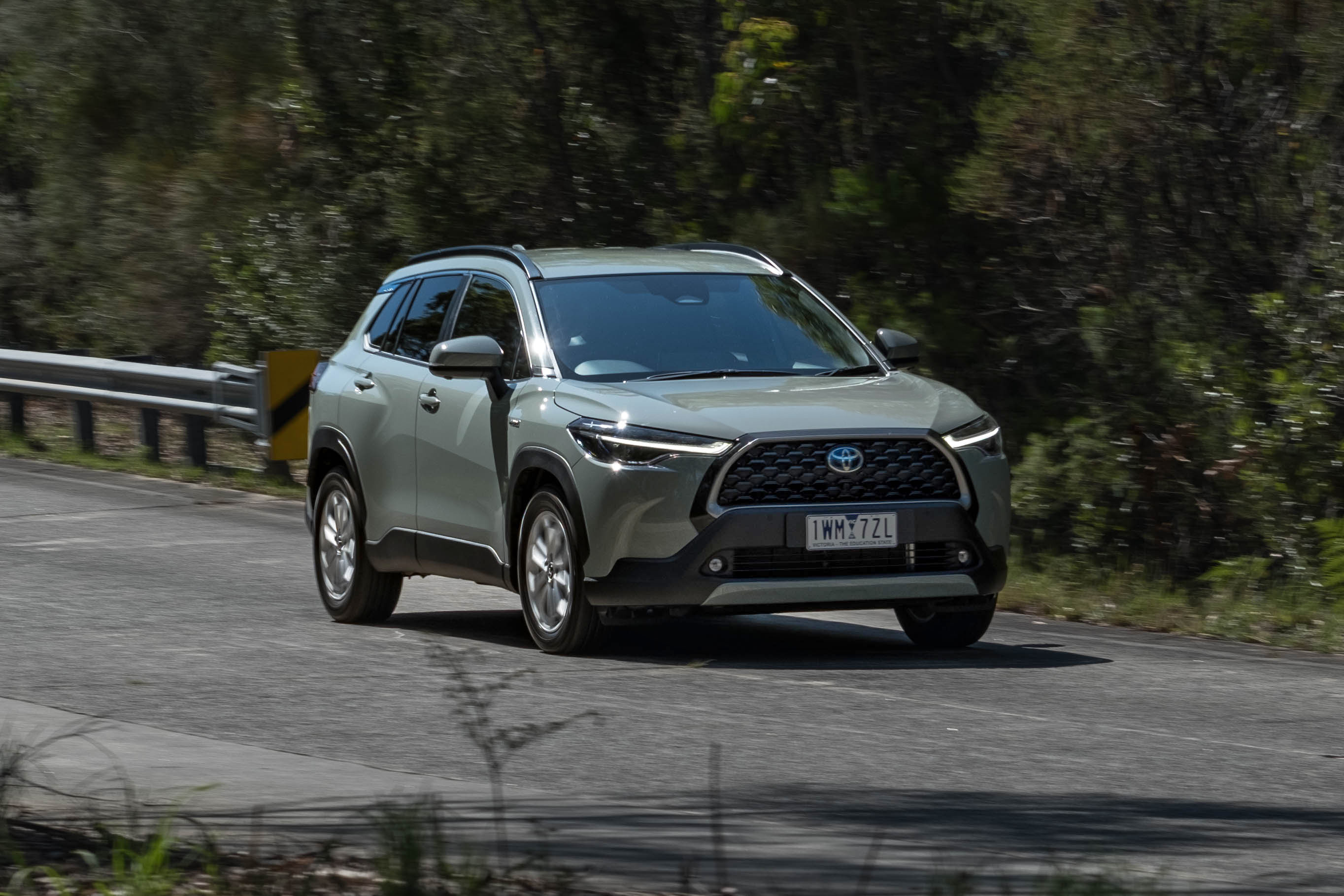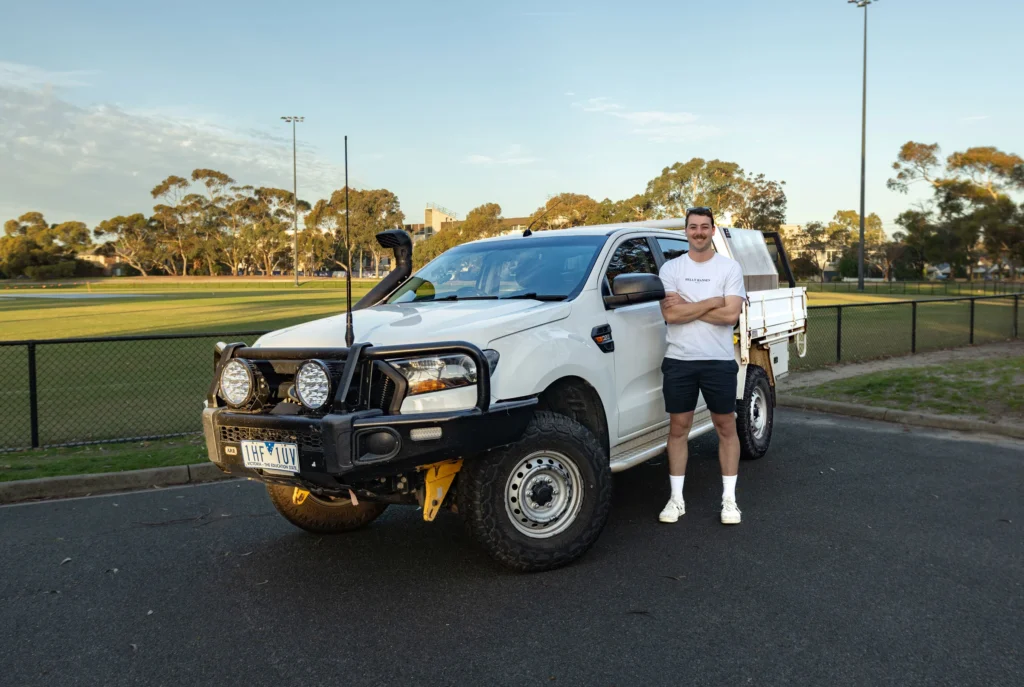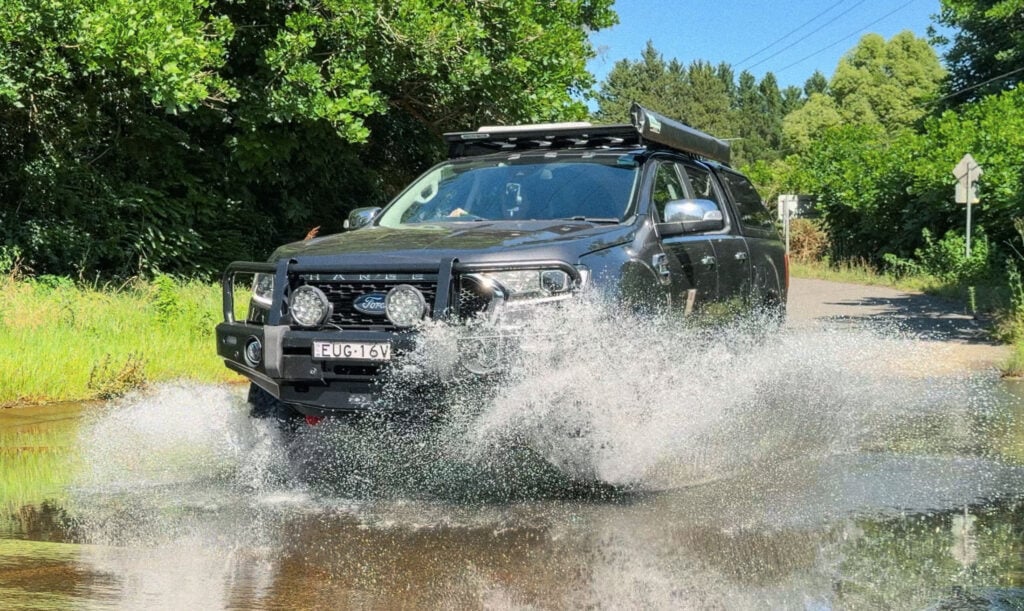Score breakdown
Things we like
- Improved ride over FWD Cross
- Plenty of gear
- Strong drivetrain
- Good cost of ownership
Not so much
- No spare tyre
- Some dodgy plastics
- Cost of Connected Services
Sometimes it takes two or three looks at a range of cars before you really get a feel for which one is best.
That’s because some cars are just so good, you’re not making a mistake in buying any one of the range.
The Corolla Cross range is a case in point. You can get a front-wheel drive petrol one that’s rather slow but is otherwise a really good car in all variants. There’s a genuine reason to buy each over another so you need your wits about you.
I had a sneaking suspicion, however, that while my colleagues said the GXL hybrid with front-wheel drive is all the Corolla Cross you’ll ever need, I wasn’t so sure. I know hardly anyone really needs all-wheel drive but there was something about the GXL E-Four that kept nagging at me. So I went back and had another go to see if they were right and I was wrong.
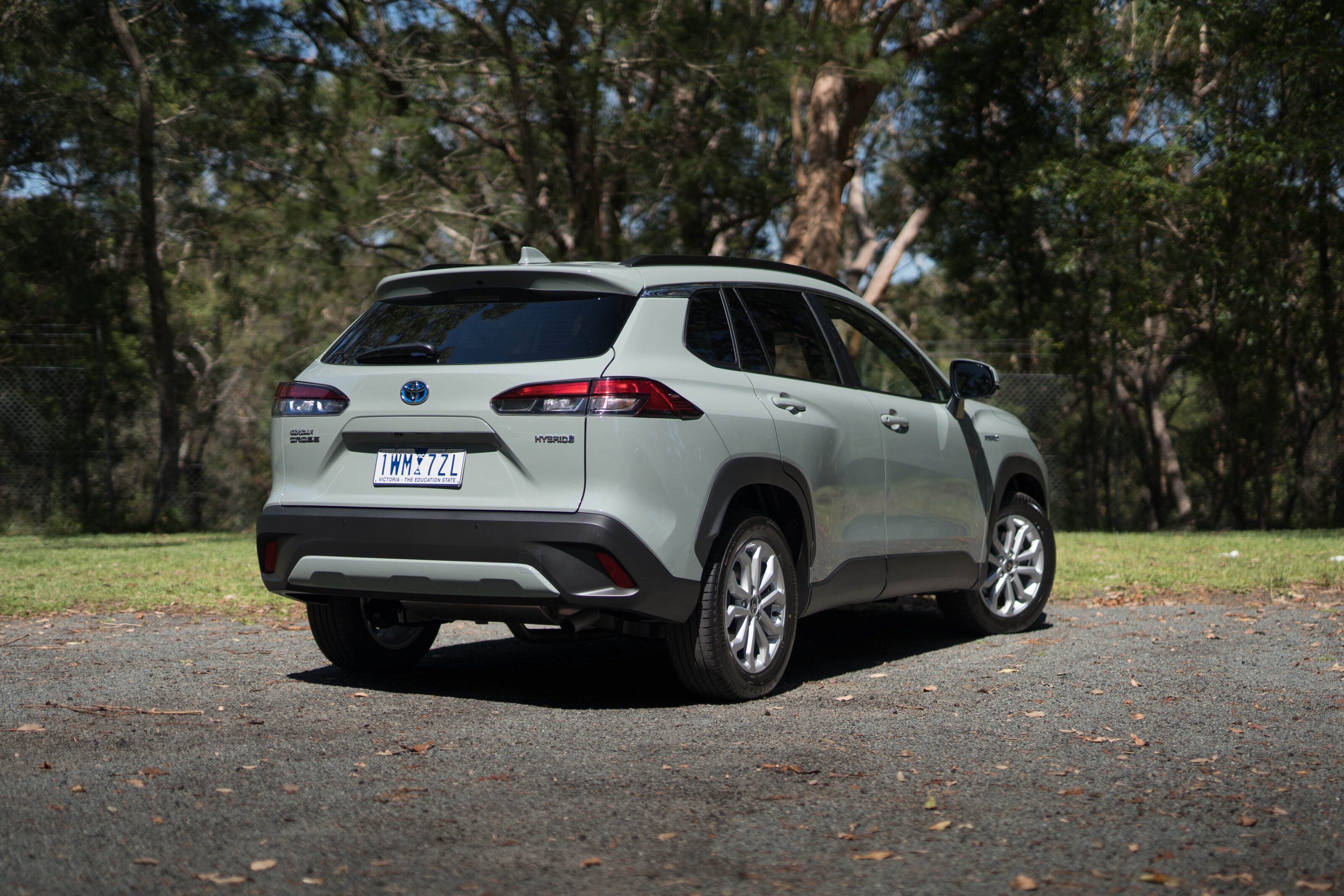
JUMP AHEAD
- How much is it, and what do you get?
- How do rivals compare on value?
- Interior comfort, space and storage
- What is it like to drive?
- How much fuel does it use?
- How safe is it?
- Warranty and running costs
- VERDICT
- Specifications
How much is it, and what do you get?
The GXL grade sits in the middle of the three-tier Corolla Cross range.
You can have a 2.0-litre petrol ($36,750), GXL front-wheel drive hybrid ($39,250), or the GXL hybrid E-Four all-wheel-drive for $42,250
All prices exclude on-road costs.
| 2023 Toyota Corolla Cross GXL features | |
|---|---|
| 17-inch alloy wheels | Fake leather interior |
| Six-speaker stereo | Part digital dashboard |
| Front and rear parking sensors | Powered, heated and folding rear vision mirrors |
| Reversing camera | Tyre repair kit |
| Keyless entry and start | 10.5-inch touchscreen |
| Dual-zone climate control | Sat nav |
| Leather steering wheel | Wireless Apple CarPlay |
| Automatic LED headlights | Android Auto (wired) |
| Power windows front and rear | Toyota Connected Services |
| Adaptive cruise control | Digital DAB radio |
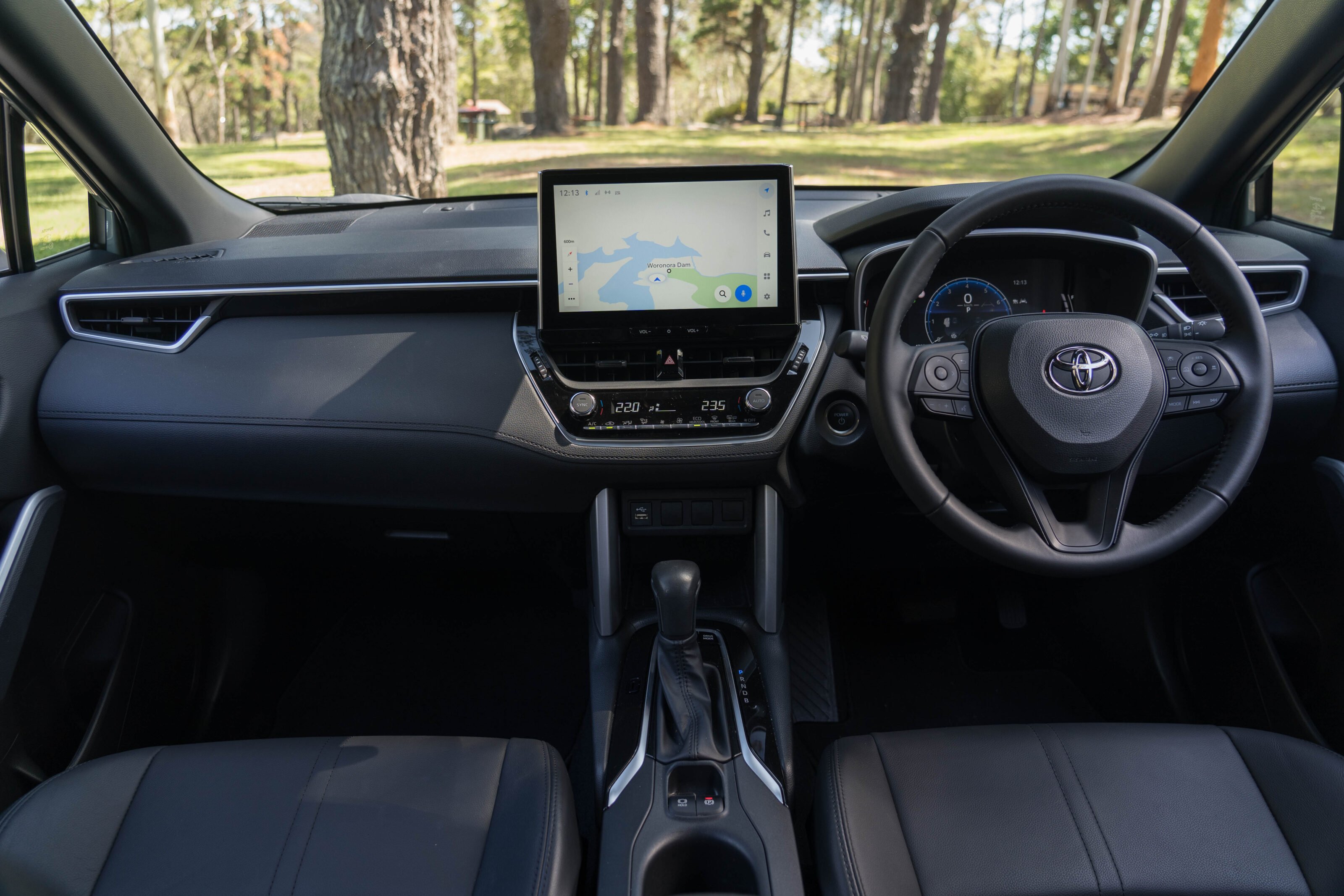
Toyota’s new media system is present and correct on the new, big touchscreen and it also comes with Toyota Connected Services. You get a year’s complimentary subscription to both halves of the two-tier feature set.
The first set is a bunch of remote connectivity bits and pieces including locking and unlocking. The second tier relates to voice control (Hey Toyota!) type stuff and is also a layer of extra services on the sat-nav.
Most of the latter is doable on your phone so it’s a bit baffling why you’d pay for it, in this case, more than $200 per year for the whole lot.
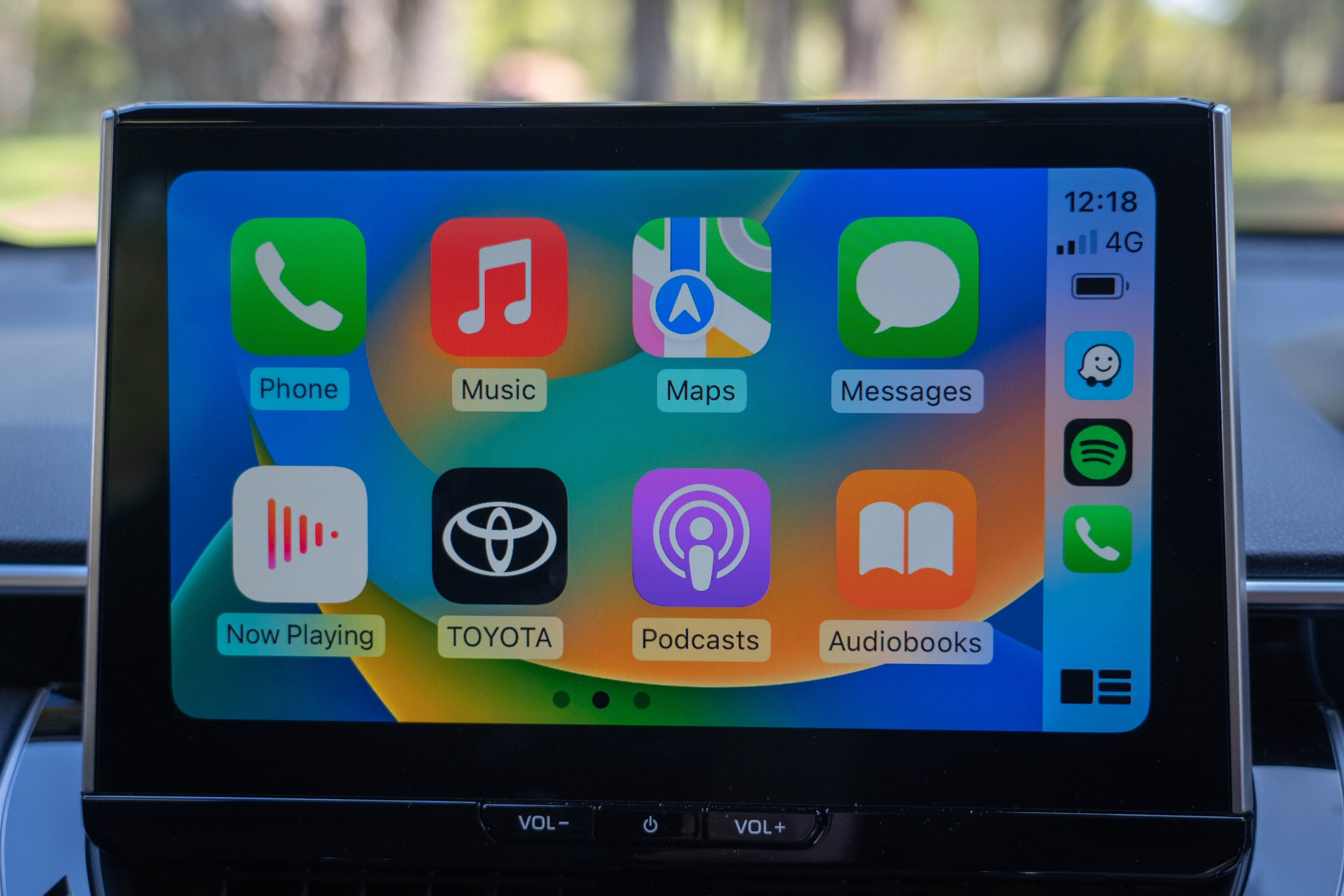
How do rivals compare on value?
A Honda HR-V e:HEV L is a jumble of letters you can drive away for $47,000.
The HR-V is a really nice car, but it doesn’t have either all-wheel drive or the kind of power and performance either the two- or all-wheel drive Corolla Cross hybrids have. It’s got a much nicer interior, but it’s limited to four seats due to the usual arcane ADR constraints around top-tether anchor points.
You can have a Haval Jolion hybrid for either $36,990 (Lux) or $40,990 (Ultra hybrid) – both drive-away – with its intensely whacky hybrid system that really does go. It isn’t available with all-wheel drive though, and bits of it could do with more work. It is very roomy, however, and the price is pretty good.
But if you want an AWD hybrid, it’s Toyota or bust.
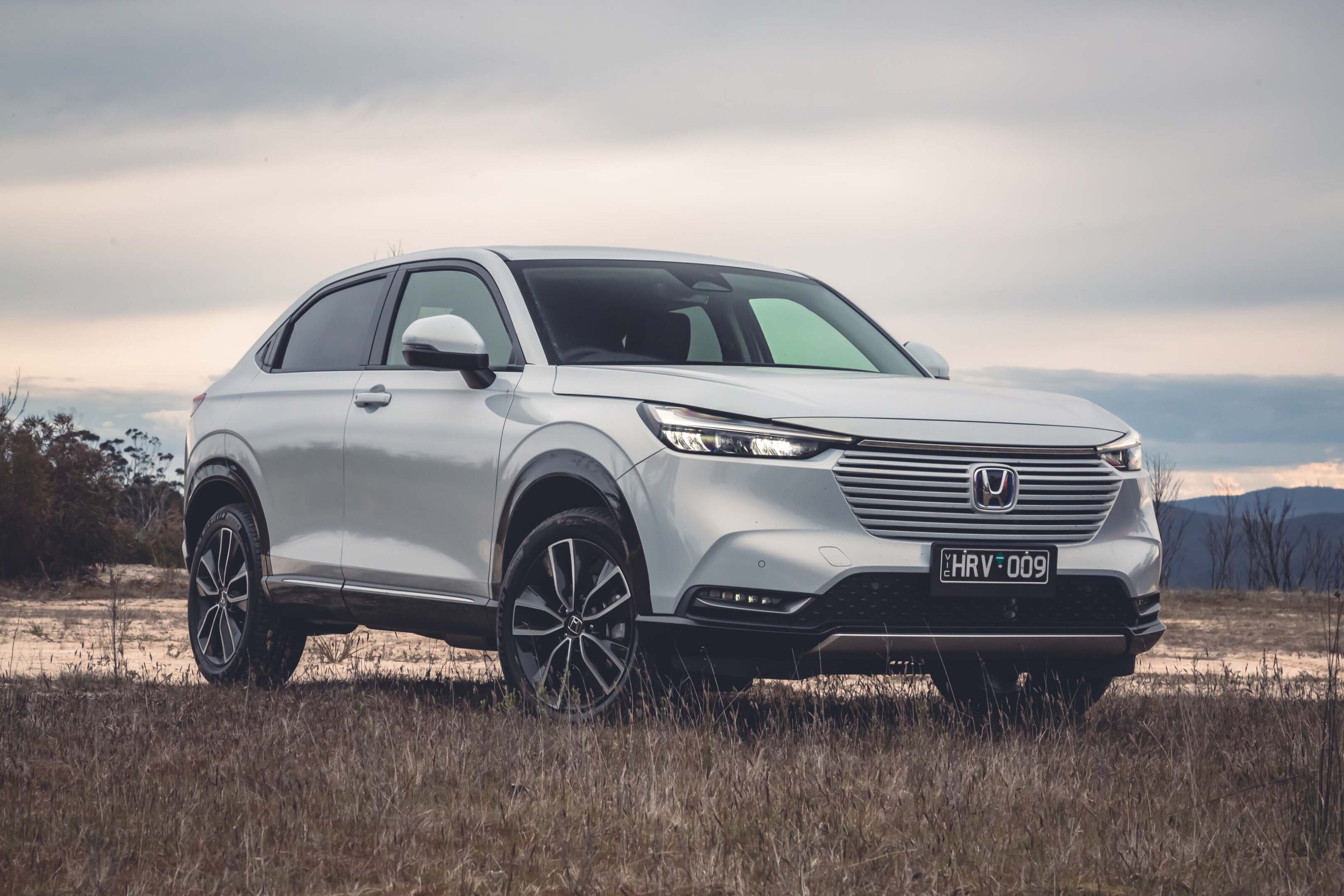
Interior comfort, space and storage
The Corolla Cross cabin is reasonably – if not lavishly – roomy.
Given this GXL is middle of the range, there are still way too many blanks scattered around the dashboard. It lets down a cabin that seems strangely less good-looking than the one in the Corolla hatch despite being largely the same.
It does feature better rear-seat accommodation than the hatch though, but not by as much as its chunky-boi exterior might suggest. When you’re in the same class as Honda’s HR-V and Kia’s Seltos – not to mention the Haval Jolion which also comes as a hybrid – you need to deliver a bit more space.
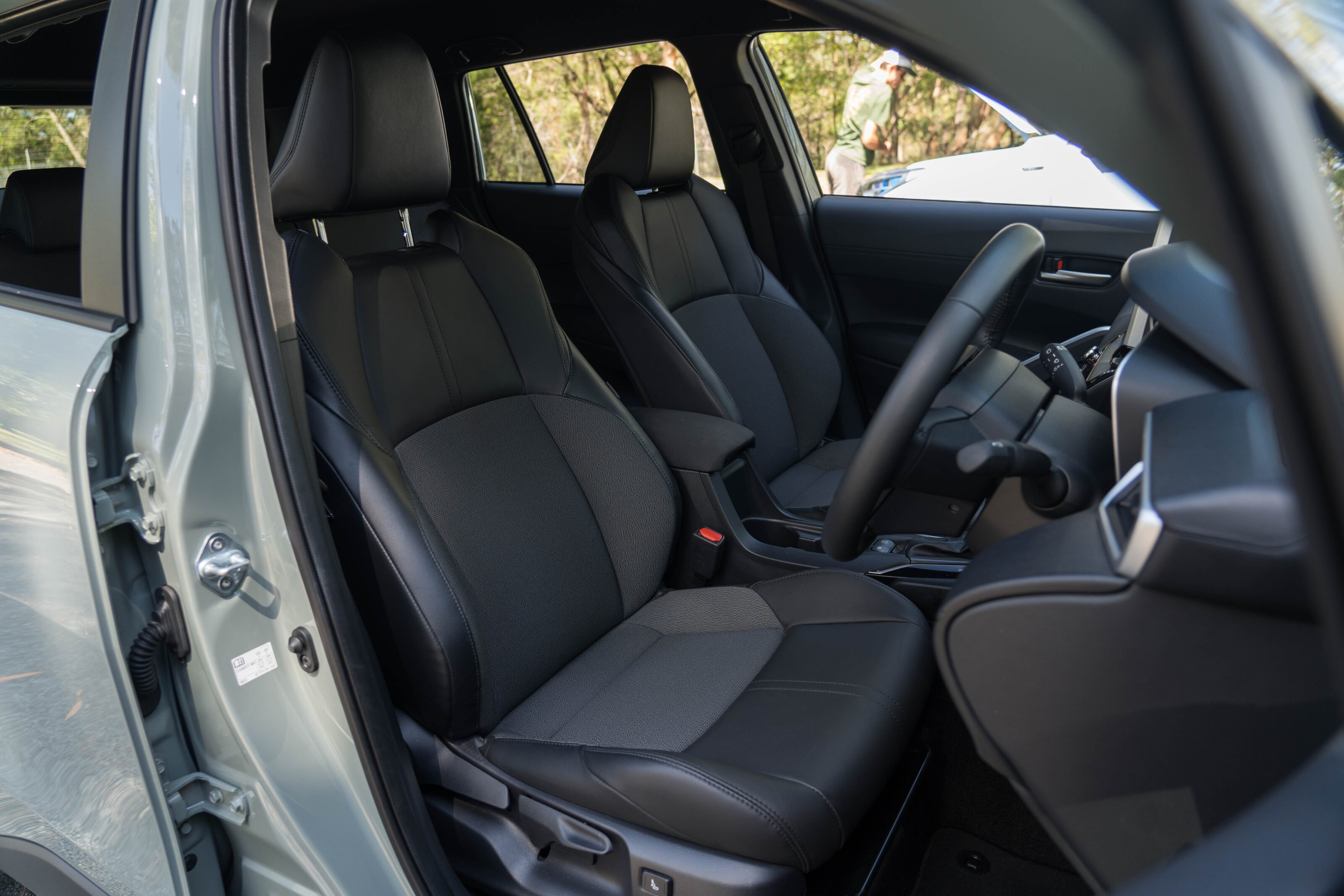
The back seat is comfortable, though, with air vents, two USB-C ports for charging and plenty of headroom and shoulder room. The windows are reasonably big, too, with good vision out compared to some.
The front seats are excellent – they look good and are very comfortable, although at this price could do with some electrical adjustment. The dodgy-looking blanks are – thankfully – not in your eye line, but the larger new and improved touchscreen is, almost dominatingly so.
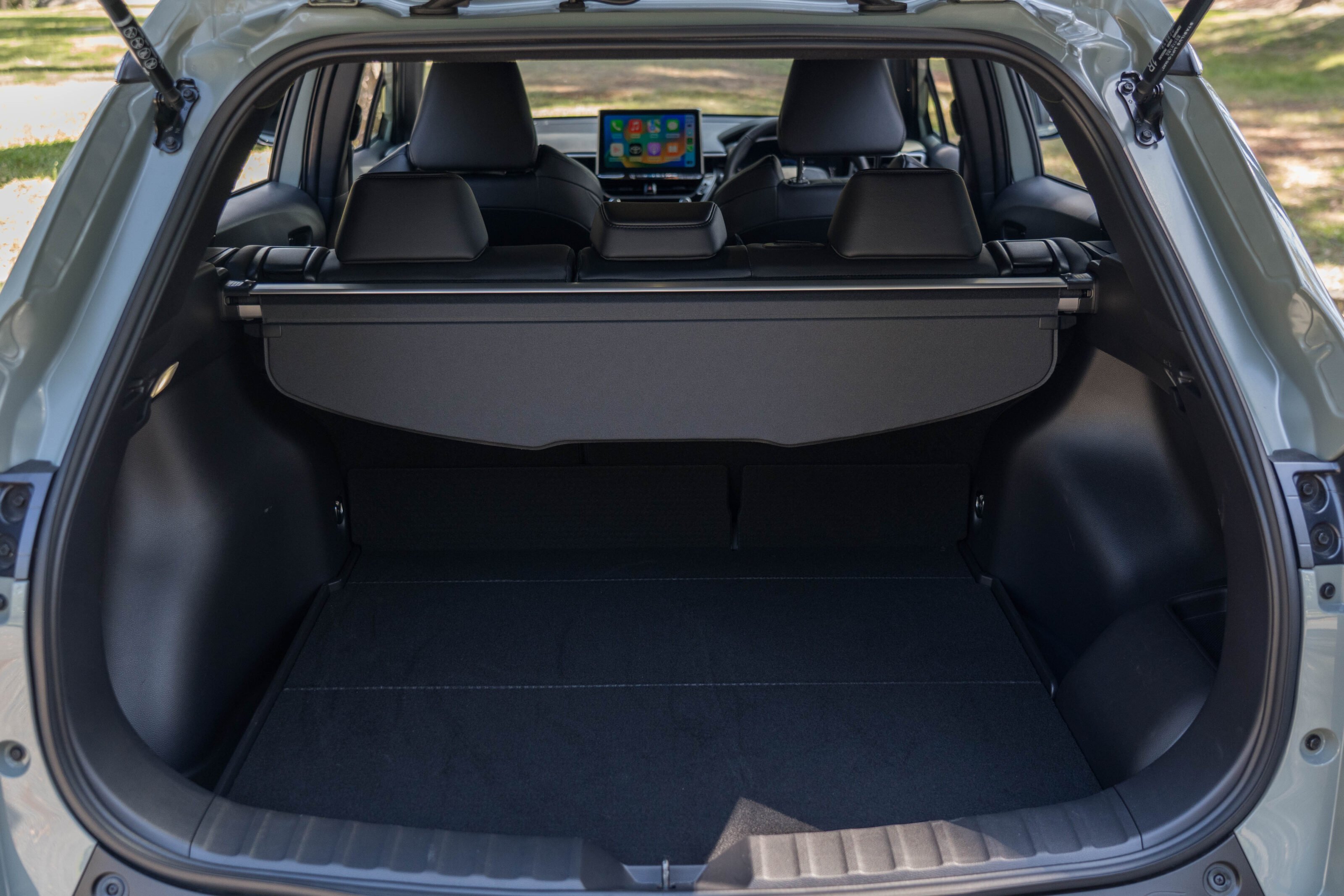
What is it like to drive?
Straight out of the gate, the E-Four feels really strong. You don’t get the torque steer of the front-wheel drive, just a lovely, smooth and linear power delivery.
It’s remarkably quick for a non-performance car, too, walloping pretty much everything in the benchmark (if meaningless) 0-100km/h sprint.
| 2023 Toyota Corolla Cross GXL E-Four hybrid drivetrain | |
|---|---|
| Drive | all-wheel drive |
| Power | 113kW @ 6000rpm |
| Torque | 190Nm @ 4400-5200rpm |
| Electric motor | Front and rear |
| Electric power and torque | 83kW/206Nm front / 30kW/84Nm rear |
| Combined power | 146kW |
| Combined torque | NA |
| Battery | lithium-ion |
| Transmission | continuously variable |
Like its RAV4 E-Four sibling, the Cross has a familiar hybrid system up front to run the front wheels with 113kW/190Nm from the engine and 83kW/206Nm from the electric motor.
The rear motor adds 30kW and 84Nm to the party for a system total of 146kW. Toyota won’t say what the total torque figure is, but it’s rather more than the ICE’s 190Nm, hence the healthy acceleration figures.
Those numbers translate to impressive on-road performance too, with a relaxed highway cruising vibe and effortless overtaking.
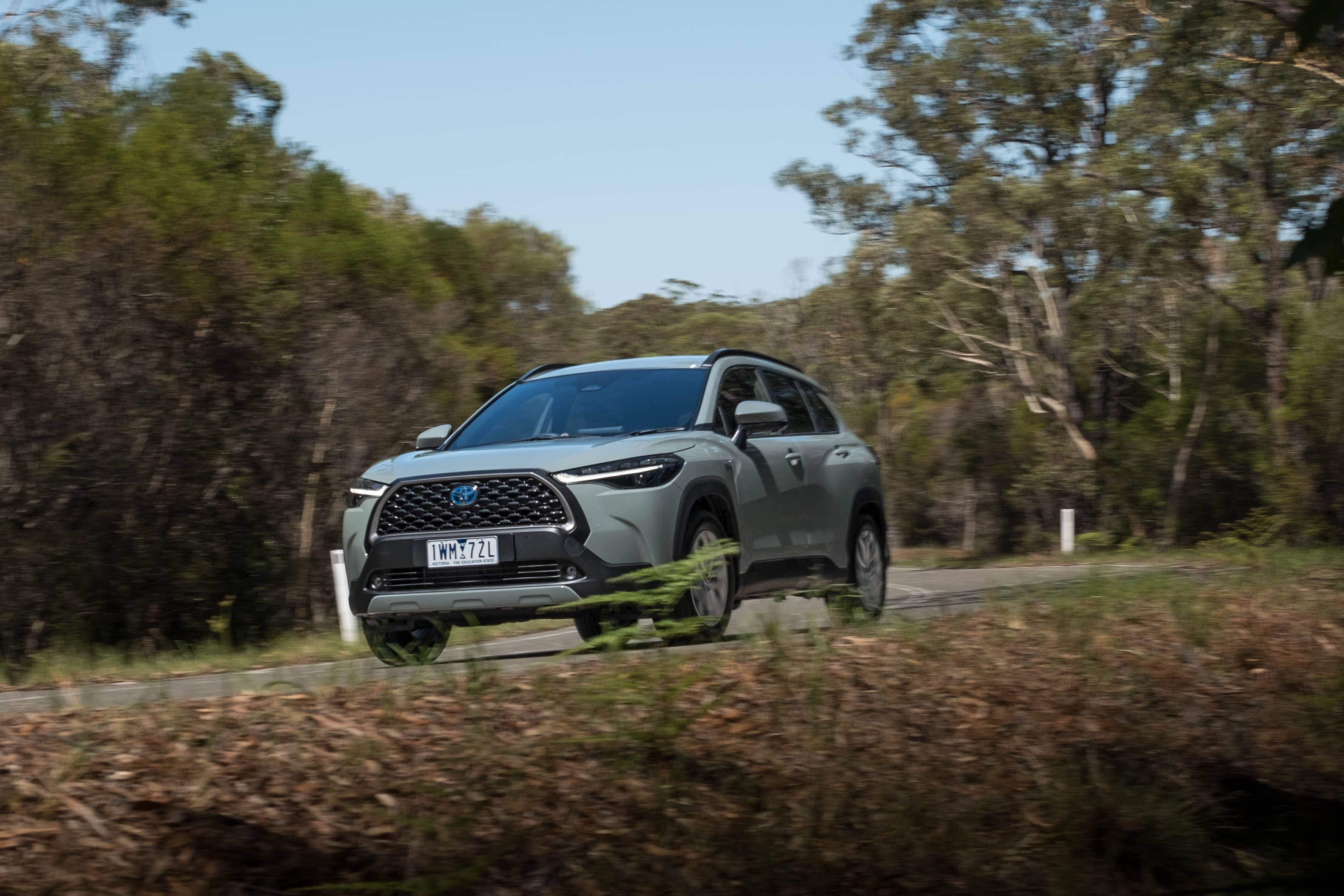
It does things you wouldn’t consider in the petrol-only version and handily outpunches the front-driver in the same places.
Another big ticket item is the switch to a multi-link rear suspension. The front-wheel drive cars make do with a torsion beam set-up and it’s not until you go for a ride in one of these that you realise how much nicer it is. The torsion beam cars are fine, but the multi-link not only smoothes out the ride but makes the whole experience much better.
It’s happier over bumps, particularly when the rears go over them or into potholes and it’s just a more pleasant place to be for a long haul. While I really like the extra grunt, I really, really like the more capable and better-sorted chassis.
Lumpy back roads are dealt with much better, too, with a more surefooted feel and more comfort to boot.
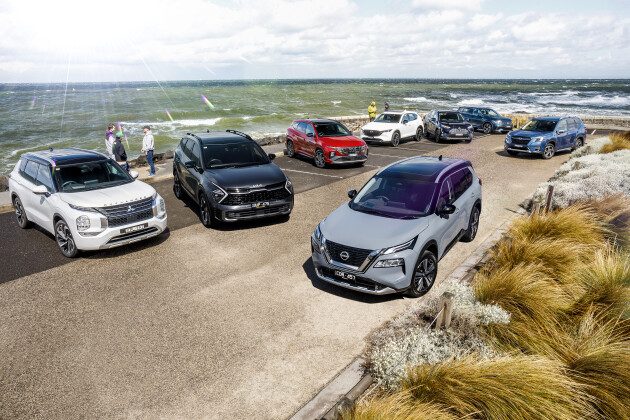
Medium SUV comparison: 2023 Mega Test
Thinking of buying a new mid-size SUV this year? We test eight of the best and most popular contenders to see where you should spend your money
How is it on fuel?
Despite lugging an additional electric motor around, the official combined cycle figure of 4.4L/100km is just 0.1L higher than the FWD.
That also translated into a real-world difference of 0.1L/100km at the pump which, incidentally, matched the trip computer.
| 2023 Toyota Corolla Cross GXL E-Four hybrid fuel economy | |
|---|---|
| Fuel economy (claimed) | 4.4L/100km |
| Fuel economy (trip computer) | 5.4L/100km |
| Fuel economy (at the pump) | 5.4L/100km |
| Fuel type | 91 RON unleaded |
| Fuel tank capacity | 43 litres |
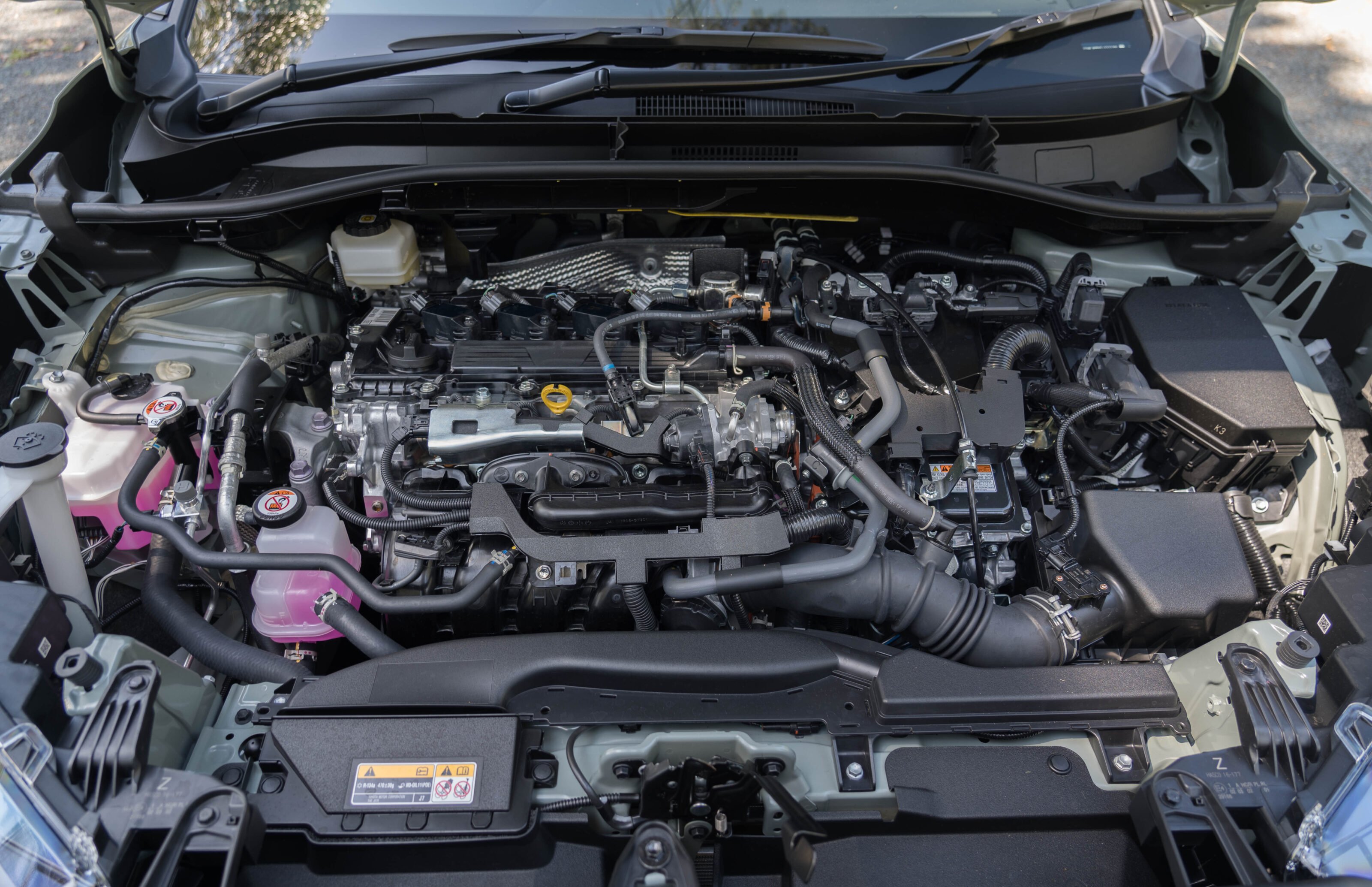
The 43-litre fuel tank is larger than the front-wheel drive’s piffling 36-litre capacity, pushing the theoretical range to nearly 800km between fills, but there’s no spare tyre.
When you pop the boot, lift the floor and the huge foam filler piece underneath (which holds the tools and tyre repair kit), there is what looks like enough space for a space-saver if the fairly amateurish-looking power connector for the rear motor was a bit more tidily installed.
How safe is it?
The Corolla Cross scored a five-star ANCAP rating in November 2022.
One of the many airbags is a front-centre item designed to prevent head clashes in a side impact.
The forward auto emergency braking (AEB) features daytime pedestrian and cyclist detection as well as operating at city and highway speeds.
There are two lots of ISOFIX points and three top tether anchors in the back seat.
| 2023 Toyota Corolla Cross GXL E-Four hybrid safety features | |
|---|---|
| 8 airbags | Front cross-traffic alert |
| ABS | Lane departure warning |
| Around-view camera | Lane-keep assist |
| Blind-spot monitoring | Rear cross-traffic alert |
| Driver attention monitor | Reverse AEB (low-speed) |
| Forward AEB (high and low speed) | Safe exit warning |
| Forward collision warning | Stability and traction controls |
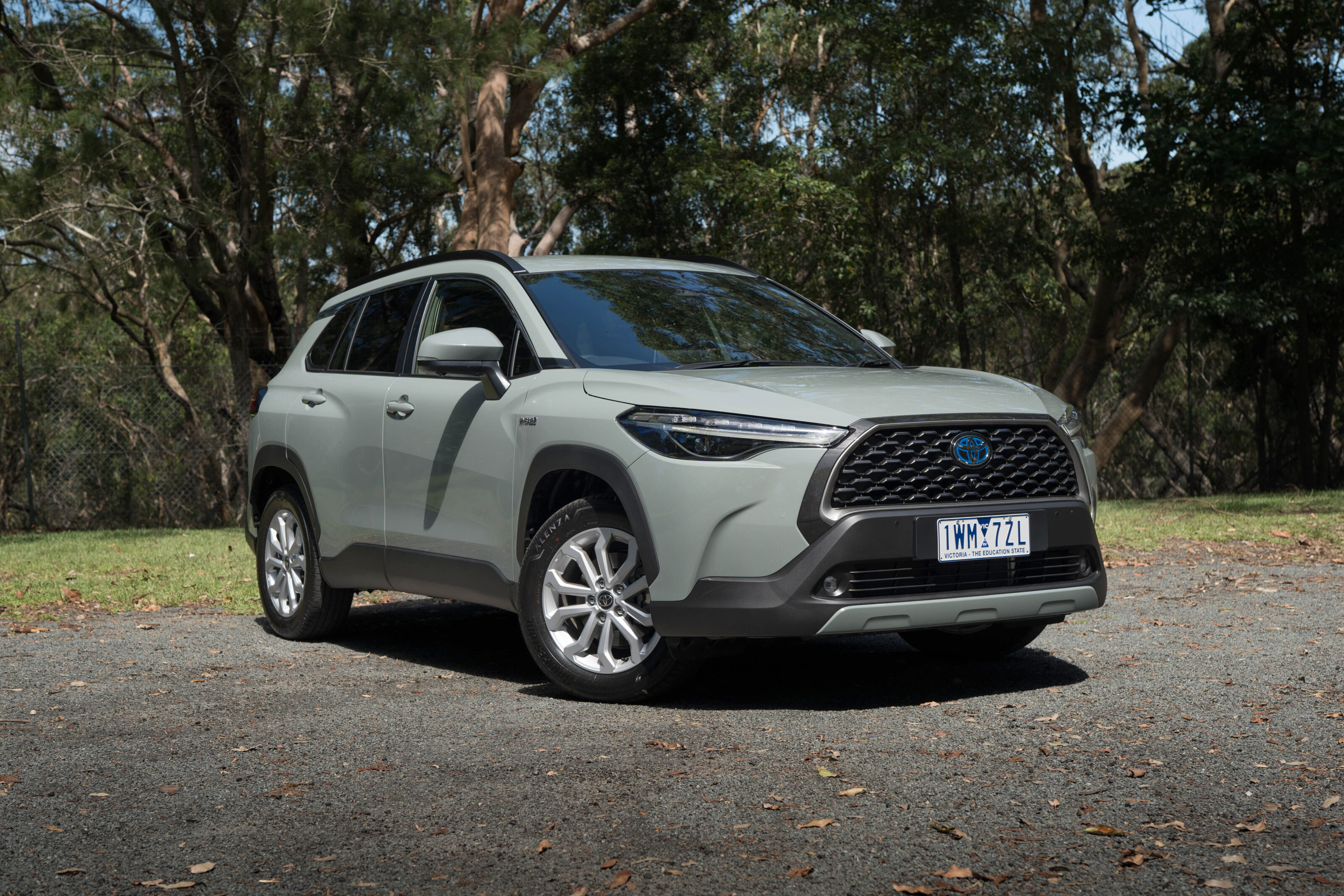
Warranty and running costs
As with all Toyotas, a five-year, unlimited-kilometre warranty is applied to the Corolla Cross.
Service with Toyota and you get an extra two years on the driveline as well as the eight-year battery warranty.
Capped-price servicing covers the first five intervals and costs $250 a go, $5 more than the hybrid hatch. That’s an average of $1250 over five services, which is, by market standards, cheap.
Prices have risen by $25 per service since the car’s October 2022 launch. Service intervals are set at 12 months or 15,000km which is a little on the short side but not shockingly so.
If you like the Toyota Connected Services features and want to keep them after the first 12 months, you’ll have to pay $9.95 per month for remote connectivity to locking, engine start and climate control. If you want to keep the fancy sat-nav features, that’s another $12.50 per month.
The feature set shrinks if you don’t pay, but the sat-nav remains operable in a basic and still very usable form.
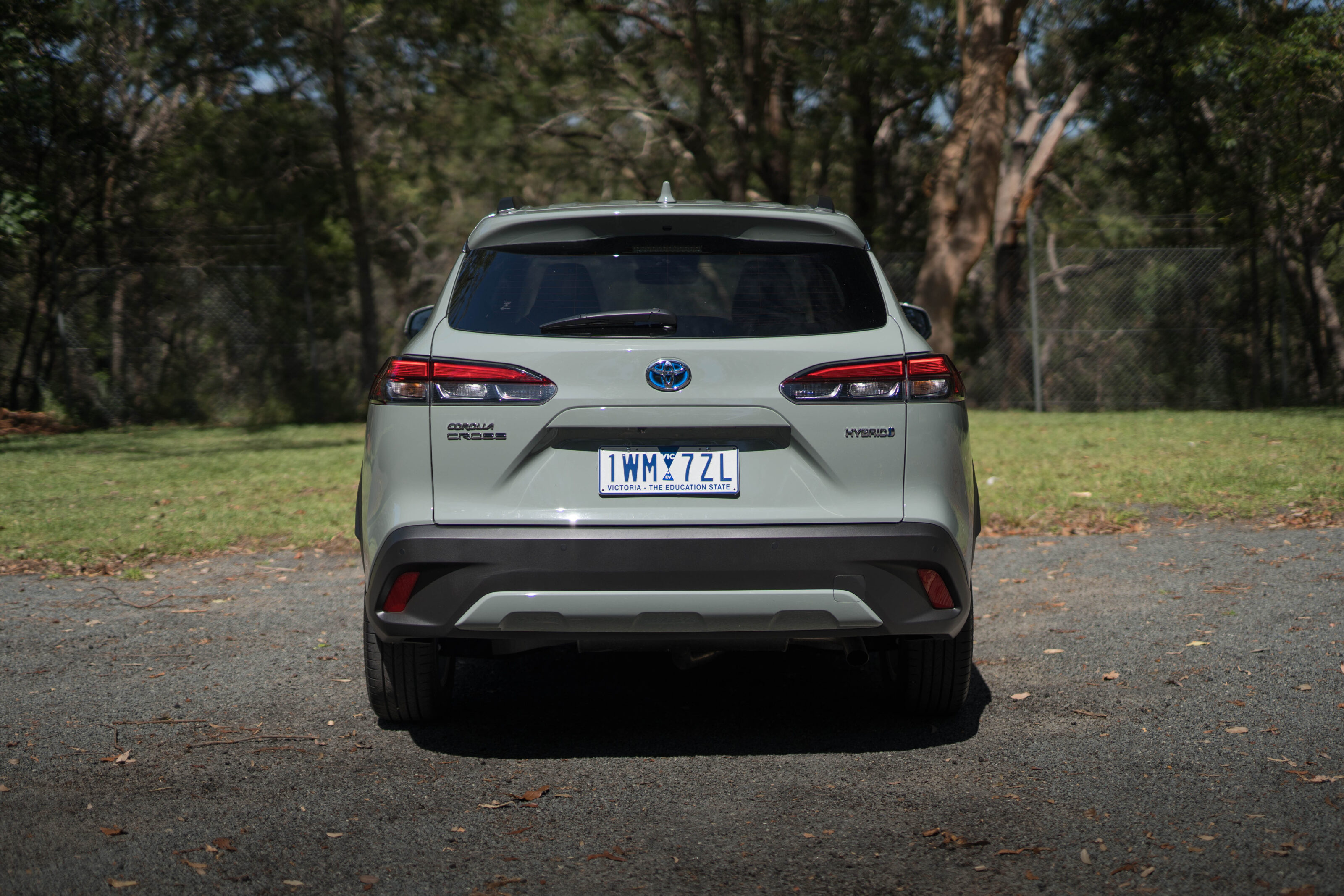
VERDICT
While not many people buy all-wheel drive versions of the Corolla Cross, there is a genuine reason for the extra three grand.
With extra oomph and a better chassis courtesy of the more advanced rear suspension, you are looking at a better car than the front-drive versions.
It’s refined, quiet and well-balanced. It’s punchy and fun to drive but sacrifices none of the good bits of hybrid ownership to make it that way. I just wish it didn’t have that bluff schnozz on it.
Am I convinced it’s the best Corolla Cross to buy? I reckon it is. But, as ever, you’ll all have your own opinions.
| 2023 Toyota Corolla Cross GXL E-Four hybrid specifications | |
|---|---|
| Body: | 5-door, 5-seat small SUV |
| Drive: | all-wheel |
| Electric motor | front and rear |
| Power | 113kW @ 6000rpm |
| Torque | 190Nm @ 4400-5200rpm |
| Electric power and torque | 83kW/206Nm front / 30kW/84Nm rear |
| Combined power | 146kW |
| Combined torque | NA |
| Battery | lithium-ion |
| Transmission | continuously variable |
| 0-100km/h: | 7.5 seconds (claimed) |
| Fuel consumption: | 4.4L/100km |
| Weight: | 1545kg |
| Suspension: | MacPherson struts front/trailing arms rear |
| L/W/H: | 4460/1825/1620 |
| Wheelbase: | 2640mm |
| Brakes: | 305mm ventilated discs front/281m solid discs rear |
| Tyres: | 215/60 R17 Bridgestone Alenza |
| Wheels: | 17-inch alloy (no spare) |
| Price: | $42,250 + on-road costs |
Score breakdown
Things we like
- Improved ride over FWD Cross
- Plenty of gear
- Strong drivetrain
- Good cost of ownership
Not so much
- No spare tyre
- Some dodgy plastics
- Cost of Connected Services
We recommend
-
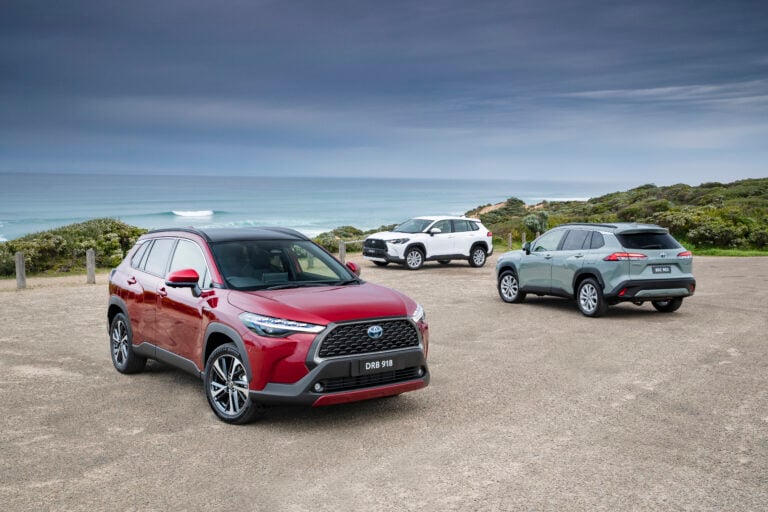 News
News2023 Toyota Corolla Cross pricing and features
Toyota's new small SUV, the Corolla Cross, has landed in Australia, slotting between the Yaris Cross and RAV4
-
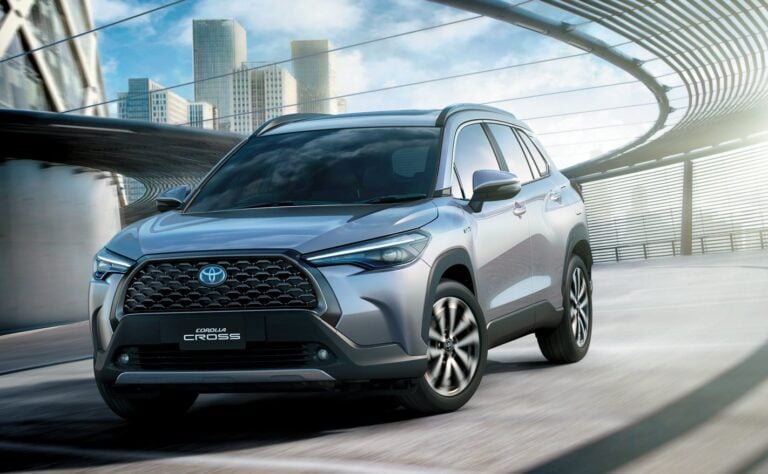 Comparisons
Comparisons2022 Toyota Corolla Cross vs rivals: spec comparison
When the Toyota Corolla Cross arrives in 2022 it’s going to have a fight on its hands – here’s how it’ll stack up against the small SUV rivals
-
 News
NewsNew car calendar 2026: All the new cars coming to Australia next year
Here’s the WhichCar by Wheels guide to all the new cars that will launch in Australia in 2026. Check back in regularly for updates...


